- Master Studies
- Universities and Programmes
- Eligibility and Application
- German or English Medium
- Financials
- Working in Germany
- Living as a Student
- Get Guidance
- Download
Universities and Programmes
Germany has different types of universities. Take a look, so that you know which one would suit you the best. The difference lies in focus and courses that these universities offer.
How do I choose a university in Germany?
There are various kinds of universities in Germany. A majority of these belong to either of the following categories:
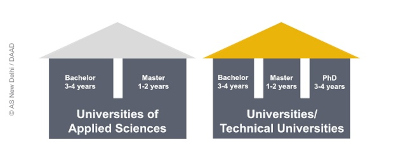
DAAD India
- Universities and Universities of Technology (TU) are research-oriented. They offer a wide variety of subjects and can award doctorate degrees.
- Universities of Applied Sciences (Hochschule für angewandte Wissenschaften – HAW/FH), on the other hand, are practice-oriented and offer courses mainly in engineering, business administration, social sciences and design. These have strong links to the industry and offer interesting possibilities such as joint supervision for your master thesis, where your professor and the company can together guide you. HAWs do not award doctoral degrees, however as a master degree holder from a HAW, you are in principle eligible to apply for PhD at a university.
Your interest and inclination should define which of the two kinds of institutions you choose!
Which is the best university in Germany?
The German answer to this question is: There is no “best university”, neither in one subject and certainly not across all subjects.
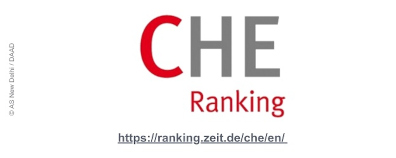
CHE Ranking
Germany offers a multidimensional ranking, considering various criteria that are important from a student’s perspective. For example, student and staff judgments on quality of teaching, atmosphere at the university, library and other equipment, student numbers, average study duration, number of graduations, third party funding etc. This way you get a good picture of the strengths of each university on www.university-ranking.de. Here you can find your programme by selecting a subject, a university or even a city in Germany!
What kind of Master programmes does Germany offer?
There is wide range of study programmes with
- German as medium of instruction
- English as the sole or primary medium of instruction, called International Programmes.
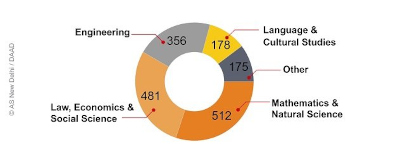
DAAD India
You can find a comprehensive database of all study programmes, in both German and English on www.study-in-germany.de.
Eligibility and Application
It is always a good idea to check if the university’s requirements and your qualifications match. And then you can start with the application procedure.
Am I eligible to apply for a masters degree course?
In Germany, every university is autonomous. This means that every university / study programme has its own set of criteria for admitting students. So please check the university website for the programme you are interested in. Here you will find the exact admission requirements.
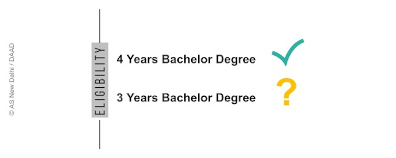
DAAD India
However, some generalisation is possible. As a four-year Bachelor degree holder from Bangladesh, Bhutan, India, Nepal or Sri Lanka, your degree is treated at par with a German bachelor degree. Most German universities will consider you eligible for masters as long as you fulfill other criteria, if any.
In case you have a three-year Bachelor degree, do get in touch with course coordinator before applying.
Some universities may ask for your TOEFL/IELTS/GRE/GMAT scores. For example, GMAT may be asked for, if you want to study economics or law. Universities will ask for very good German language skills in case you want to take up a programme in German medium. In such case, your knowledge of German needs to be certified through examinations like the TestDaF or DSH.
What kind of Master programmes does Germany offer?
The German academic year is divided into two semesters: Winter semester (October – March) and summer semester (April – September). So German universities have two intakes.
The following timeline refers to courses beginning with the winter semester. In case you find a course that begins with the summer semester, just calculate the months accordingly and proceed!
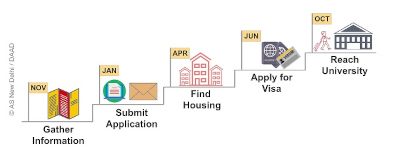
DAAD India
Let us get into the details now:
| Month | Application step |
|---|---|
| October – November |
|
| January – March |
|
| March – June |
|
| July |
|
| September – October | Arrive in Germany at least a week before your course begins. Contact the International Office (Akademisches Auslandsamt) of your university for guidance. |
| October – December | Get your residence permit within the first three months of your stay in Germany from the Foreigners’ Registration Office (Ausländeramt). |
Must I learn German?
As a student in Germany, your life will not be limited to the university campus. You will surely want to interact with people, do your internships, travel through the country-side and make the best of your time there. You may also want to gather work experience in Germany or build your career there. This is where knowledge of German will be of great advantage for you!
Universities offer beginner and well as advanced level courses where you can learn German. You can also start learning the language while you are still in your home country at the Goethe-Instituts (Max–Mueller Bhavan) / Goethe-Zentrums.
German or English Medium
Germany offers education in German as well as in English. Different subject fields can have different language requirements.
| Can I do my Masters completely in English medium? | Can I do my Masters in German medium? |
|---|---|
| Germany offers close to 2000 International Programmes with English as the sole or primary medium of instruction. These programmes are called International Programmes.
Few of these programmes may require students to have learnt/learn some German language during masters. |
You can certainly do your masters in German medium if you have the requisite German language proficiency.
A comprehensive database of all study programmes, in German and English medium, is available on www.study-in-germany.de. |
Are there any scholarships available?
Funding in Germany is typically available for research, so basically for PhD and above. However, the DAAD offers the following scholarships for master’s:
- Development-Related Postgraduate Courses (EPOS)
- Helmut-Schmidt-Programme (Master’s Scholarships for Public Policy and Good Governance – PPGG)
- Combined Study and Practice Stays for Engineers from Developing Countries (KOSPIE) with Indian IITs
To get a comprehensive overview of various funding possibilities, visit www.funding-guide.de.
Financials
While in a foreign country being able to manage your finances on your own is very important. You would need to plan your budget keeping your living expenses, travel costs and tuition fees if any.
Can I work in Germany as a student?
Please find the information here below.
Which is the best university in Germany?
The German answer to this question is: There is no “best university”, neither in one subject and certainly not across all subjects.

CHE Ranking
Germany offers a multidimensional ranking, considering various criteria that are important from a student’s perspective. For example, student and staff judgments on quality of teaching, atmosphere at the university, library and other equipment, student numbers, average study duration, number of graduations, third party funding etc. This way you get a good picture of the strengths of each university on www.university-ranking.de. Here you can find your programme by selecting a subject, a university or even a city in Germany!
What kind of Master programmes does Germany offer?
There is wide range of study programmes with
- German as medium of instruction
- English as the sole or primary medium of instruction, called International Programmes.

DAAD India
You can find a comprehensive database of all study programmes, in both German and English on www.study-in-germany.de.
Am I eligible to apply for a masters degree course?
In Germany, every university is autonomous. This means that every university / study programme has its own set of criteria for admitting students. So please check the university website for the programme you are interested in. Here you will find the exact admission requirements.

DAAD India
However, some generalisation is possible. As a four-year Bachelor degree holder from Bangladesh, Bhutan, India, Nepal or Sri Lanka, your degree is treated at par with a German bachelor degree. Most German universities will consider you eligible for masters as long as you fulfill other criteria, if any.
In case you have a three-year Bachelor degree, do get in touch with course coordinator before applying.
Some universities may ask for your TOEFL/IELTS/GRE/GMAT scores. For example, GMAT may be asked for, if you want to study economics or law. Universities will ask for very good German language skills in case you want to take up a programme in German medium. In such case, your knowledge of German needs to be certified through examinations like the TestDaF or DSH.
Working in Germany
You can of course work in Germany as long as you respect the regulations, which are not complex and are fairly easy to understand and follow.
Must I learn German?
As a student in Germany, your life will not be limited to the university campus. You will surely want to interact with people, do your internships, travel through the country-side and make the best of your time there. You may also want to gather work experience in Germany or build your career there. This is where knowledge of German will be of great advantage for you!
Universities offer beginner and well as advanced level courses where you can learn German. You can also start learning the language while you are still in your home country at the Goethe-Instituts (Max–Mueller Bhavan) / Goethe-Zentrums.
Are there any scholarships available?
Funding in Germany is typically available for research, so basically for PhD and above. However, the DAAD offers the following scholarships for master’s:
- Development-Related Postgraduate Courses (EPOS)
- Helmut-Schmidt-Programme (Master’s Scholarships for Public Policy and Good Governance – PPGG)
- Combined Study and Practice Stays for Engineers from Developing Countries (KOSPIE) with Indian IITs
To get a comprehensive overview of various funding possibilities, visit www.funding-guide.de.
Living as a Student
Living on your own comes with lots of responsibilities, at the same time it can also be very interesting. It starts with finding a place to stay, learning how to cook, shopping on a budget, making friends and connections. Hope this section helps you with some of your questions.
Can I work in Germany as a student?
Please find the information here below.
Which is the best university in Germany?
The German answer to this question is: There is no “best university”, neither in one subject and certainly not across all subjects.

CHE Ranking
Germany offers a multidimensional ranking, considering various criteria that are important from a student’s perspective. For example, student and staff judgments on quality of teaching, atmosphere at the university, library and other equipment, student numbers, average study duration, number of graduations, third party funding etc. This way you get a good picture of the strengths of each university on www.university-ranking.de. Here you can find your programme by selecting a subject, a university or even a city in Germany!
Get Guidance
Whether you are in India, Nepal or Bhutan, the DAAD is there to help you with your study in Germany plans. Check out how you can reach us!
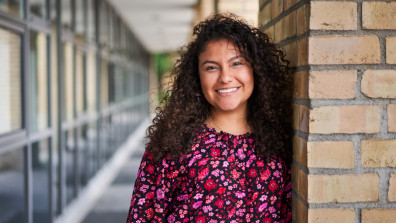
DAAD/von Allwörden
My GUIDE
Find your way through the richness of German study programmes. Based on your academic background and interests, My GUIDE will find suitable study programmes for you. Check your entrance qualification and contact your favourite university.
Visit My GUIDE

DAAD ASND
Individual Appointments
You can connect with the DAAD offices in Bengaluru, Chennai, New Delhi and Pune or meet Team DAAD online!

iStockphoto
Information Sessions
The DAAD offers free of cost information session about studying in Germany regularly. Check which dates and topics suit you, register and join!
Click here for dates, timings and registration links: www.daad.in/events.